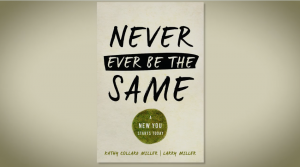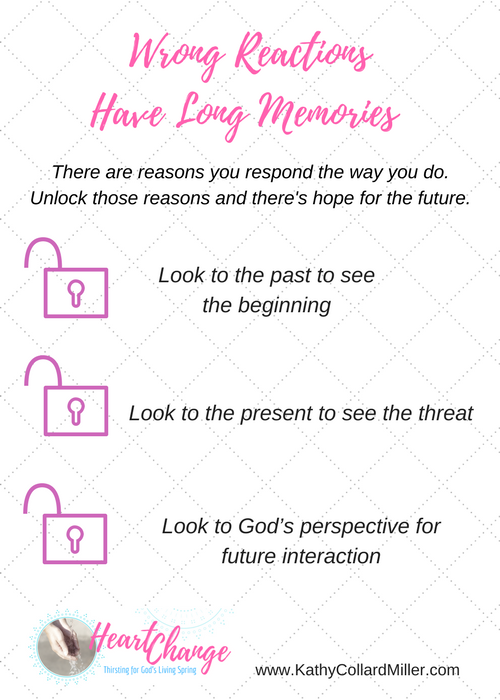And the winner of the drawing for Little Women; Big God by Debbie W. Wilson is… DRUM ROLL…Joy!
Congratulations, Joy! I will give your information to Debbie and she will contact you. Thank you very much to everyone who participated.
It might be an exaggeration that wrong reactions have the longest memory, but let me explain what I mean.
(Let me break in here before you read on, to give you an update on Kathy Carlton Willis’, whose previous guest post alerted us in the Comments Section to her situation after being impacted by Hurricane Harvey. I asked how we could help. Here’s how you can help if you’d like:
Kathy is planning to gather gift cards from anyone who wants to help. She will then distribute those along with baked goods as she sees a need in her neighborhood and community. And she’ll offer to pray with people and be a listening ear. I know she’ll represent the Lord beautifully in reaching out. If you would like to find out more information, you can email her at [email protected]. Let’s all continue to pray that the Lord will shine and be glorified through His people representing Him in every challenge the United States is facing.)
NOW, here’s my continuing post:
There are reasons–but not excuses–for our current wrong choices and they feed upon a long memory of past wounds and hurts. We’ve all said things like, “I can’t believe I keep doing that. I’ve prayed and said I won’t do it again but it keeps happening.” But there is hope. Let me offer three ideas from the past and present which can bring about loving and right choices for a godly future.
There are reasons–but not excuses–for our current wrong choices. TWEET THAT!
1. Look to the past to see the beginning.
When painful things happen to us as children, we blame ourselves or we make wrong conclusions about God, life, and other people. We can “hear” a message that somehow screams, “I’m the cause. I must be hopeless, unloveable, or incapable (etc).” Or we think, “The world (or a person) is not safe; I’m on my own.” When I was molested as an eight-year-old, I felt like a shameful little girl who should have prevented it from happening. So I concluded, “I better act perfectly to hide my dirtiness. Don’t let anyone know the real me. They won’t like me.” Of course those were lies but I still believed them.
Few children, if any, can process what happens to them with God’s lens of truth and love. We believe Satan’s lies who wants to destroy us.
I believed those lies, and thus, anytime someone implied I should do a better job at something, I became angry blaming them. I didn’t want to be exposed as imperfect because it brought back the feelings of being that dirty little girl who didn’t prevent the bad thing from occurring.
As an adult who could begin to see the lies I was believing, the Holy Spirit began to help me replace the lies with God’s truth. In the case of the molestation, the truth was I wasn’t responsible for the abuse. God loved me then and loves me now even though I’m imperfect.
Author Mike Wilkerson writes, “It’s not our raw experiences that determine our lives but the meaning we make of them—the stories we tell and the stories we believe.”
2. Look to the present to see the threat.
Every time we react sinfully (anger, contempt, procrastination, passive/aggressive, discontent, etc.) we feel like someone or something is threatening our good self-image, our comfort, our finances…anything we value that we depend upon for take away the pain of the past. Many times what we value become “idols.” We “worship” those rather than looking to God to define, comfort, or provide for us. In that sinning moment, we have returned to feeling like the child who is believing lies, like I must take care of myself, no one can be trusted.
James wrote, “Instead you ought to say, ‘If the Lord wills, we will live and do this or that.’ As it is you boast in your arrogance. All such boasting is evil” (4:15-16).
The most difficult thing is to surrender to how God allows people to treat us or circumstances to assail us.
That doesn’t mean we never share our opinions or take action. But instead of automatically reacting with self-protective responses, we must seek God first. Just because it seems “natural” to respond our usual sinful way, we aren’t reacting “supernaturally” in God’s power. Blaming, worry, defensiveness, and other ungodly reactions seem to protect us but don’t bring glory to God or fulfill His will. And they really aren’t effective anyway.
An unknown person said, “The only way God can show us he’s in control is to put us in situations we can’t control.”
3. Look to God’s perspective of the person or situation for future interaction.
When we overreact, we take other people’s actions personally. We feel like we’re back to being blamed, labeled, or attacked like we were as children.
But most of the time, that person is just trying to protect themselves. It’s not about us, it’s about their insecurity or lack of trust in God. And any difficult circumstances is God’s gift of transforming us, not destroying us. Instead of fighting off the “threat,” we can look through God’s eyes of love and grace.
The Apostle Paul wrote during a time of being misunderstood and accused, “I am speaking the truth in Christ—I am not lying; my conscience bears me witness in the Holy Spirit—that I have great sorrow and unceasing anguish in my heart. For I could wish that I myself were accursed and cut off from Christ for the sake of my brothers, my kinsmen according to the flesh.” (ESV).
Can you imagine that kind of surrender? Paul didn’t take their attacks personally, he wanted the best for them. God can empower us to have that kind of reaction. We can be gracious as we speak the truth in love.
Alan Redpath said, “Before we can pray, ‘Lord, Thy Kingdom come,’ we must be willing to pray, ‘My Kingdom go.'”
Which of those three insights would you like to concentrate on so that your “natural” reactions can turn into “supernatural” reactions? Or please share your perspective on how the past affects–or doesn’t–someone today. I’d love to hear your thoughts and opinions so I can glean from your wisdom. Please share in the comment box below. I look forward to hearing from you.
This is based on our book Never Ever Be the Same: A New You Starts Today (Leafwood) by myself and Larry, my husband.

